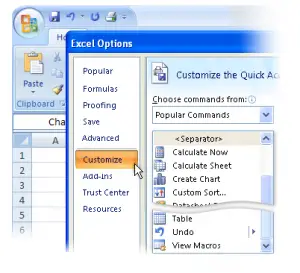

- MICROSOFT EXCEL HELP MENU FOR MAC
- MICROSOFT EXCEL HELP MENU FULL
- MICROSOFT EXCEL HELP MENU SOFTWARE
- MICROSOFT EXCEL HELP MENU PROFESSIONAL
- MICROSOFT EXCEL HELP MENU MAC
The first cell is the top left corner of the range, and the second cell is the lower right corner of the range. Any two cell locations separated by a colon are known as a cell range. This is referred to as a cell range and is documented as follows: A1:D5. You should see several cells highlighted, as shown in Figure 1.5. Click and hold the left mouse button and drag the mouse pointer back to cell D5.Check to make sure column letter D and row number 5 are highlighted, as shown in Figure 1.4.Place your mouse pointer over cell D5 and click.The following steps explain how you can navigate in an Excel worksheet: This would be referred to as cell location A1 or cell reference A1. For example, the cell that is currently activated in Figure 1.3 is A1. Each cell in an Excel worksheet contains an address, which is defined by a column letter followed by a row number. The worksheet contains several rectangles called cells for entering numeric and non-numeric data. Figure 1.3 Restored Worksheet Navigating Worksheetsĭata are entered and managed in an Excel worksheet. However, if your screen looks like Figure 1.3 after starting Excel, you should click the Maximize button, as shown in the figure.
MICROSOFT EXCEL HELP MENU FULL
Your workbook should already be maximized (or shown at full size) once Excel is started, as shown in Figure 1.2. Figure 1.2 Blank Workbook Figure 1.2a Blank Workbook (right-side) Your screen may be slightly different based on the version you’re using.

Take some time to familiarize yourself with this screen. Figure 1.2 shows a blank workbook after starting Excel. Excel will assign a file name to the workbook, such as Book1, Book2, Book3, and so on, depending on how many new workbooks are opened.
MICROSOFT EXCEL HELP MENU MAC
When you see this icon, it means we are providing information specific to Mac users.Ī workbook is an Excel file that contains one or more worksheets (referred to as spreadsheets). We have attempted to provide alternate screenshots and instructions for the Mac version when the differences are significant. The screenshots and step-by-step instructions in this textbook are specific to Excel for Windows.
MICROSOFT EXCEL HELP MENU FOR MAC
There are also a few features that are not available in the Excel for Mac version.

There are, however, some differences with the Excel interface. Most of the features, tools and commands are available in both versions.
MICROSOFT EXCEL HELP MENU SOFTWARE
The Excel for Windows and Excel for Mac software versions are very similar.
MICROSOFT EXCEL HELP MENU PROFESSIONAL
The information produced in Excel can be used to make decisions in both professional and personal contexts. These computations ultimately convert that quantitative data into information. Taking a very simple view, Excel is a tool that allows you to enter quantitative data into an electronic spreadsheet to apply one or many mathematical computations. This chapter provides an overview of the Excel application along with an orientation for accessing the commands and features of an Excel workbook. No matter which career path you choose, you will likely need to use Excel to accomplish your professional objectives, some of which may occur daily. Microsoft Excel is perhaps the most versatile and widely used of all the Office applications. Microsoft® Office contains a variety of tools that help people accomplish many personal and professional objectives.


 0 kommentar(er)
0 kommentar(er)
